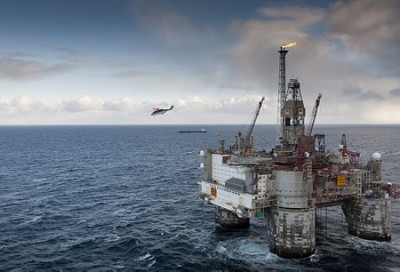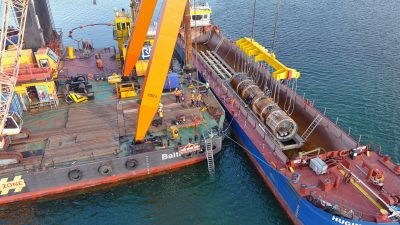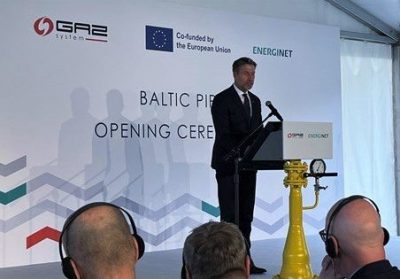UPDATED: Norwegian oil authorities and several top politicians called for heightened security around Norway’s offshore oil and gas platforms and gas pipelines, and the government responded. The calls followed suspected sabotage of the Nord Steam pipelines in the Baltic Sea, and recent reports of large unidentified drones flying around several Norwegian installations in the North Sea.

Oil & Energy Minister Terje Aasland, under pressure to beef up security, had claimed it was already high. He later added, though, that there was a sudden flurry of contact on Tuesday among the government, police, the military and commercial operators in the North Sea, and preparedness would be “sharpened.”
Both the Greens and Progress parties had already raised alarms around the security of Norwegian gas pipelines as the emergency situation unfolded Tuesday in the Baltic. Large holes were discovered in both the Nord Stream and Nord Stream 2 pipelines, which have carried gas between Russia and Germany through the Baltic. The pipeline damage was discovered just as Norway and Poland were celebrating the opening of the new Baltic Pipe to send Norwegian gas that Aasland claimed will “contribute to strengthening energy security in Southern Scandinavia, Poland and other countries in the region.”
Poland’s Prime Minister Mateusz Morawiecki, taking part in the new pipeline ceremonies in Szczecin, claimed the gaping holes and potentially dangerous gas leaks found on the Nord Stream pipelines were “clearly an act of sabotage” and another escalation of Russia’s war on Ukraine. Danish Prime Minister Mette Frederiksen also said it was “hard to believe” the pipeline damage was coincidental, as emergency crews and military vessels streamed to the site of the leaks off the Danish island of Bornholm. “Sabotage cannot be ruled out,” Frederiksen said. Aasland later agreed as well.
Two large explosions were also recorded in the vicinity of the Nord Stream pipelines by the Swedish earthquake center on Tuesday afternoon, while Norwegian seismologists registered an “incident” on Monday evening. Danish military confirmed huge gas bubbles in the seas around Bornholm, as large as 100 meters in diameter.
Suspicious drone activity in the North Sea
The Norwegian Petroleum Safety Authority (Petroleumtilsynet) announced Tuesday afternoon that it “does not wish to speculate” about the causes of the gas leaks in the Baltic. It noted, however, that it already has “urged all operators and vessel owners on the Norwegian Continental Shelf to show increased vigilance,” after “the observation of unidentified drones/aircraft close to offshore facilities.” It confirmed that cases in which drones “have infringed the safety zone around facilities” are now being investigated by the Norwegian police.

Marius Arion Nilsen, energy policy spokesman for the Progress Party, told news bureau NTB that he found it “very alarming if the leaks from the Nord Stream and Nord Stream 2 are caused by sabotage.” They come just as Norwegian state oil company Equinor has announced a long-term gas sales agreement with Poland’s PGNiG to be exported from Norway to Poland through the new Baltic Pipe. The Baltic pipeline project connects the Norwegian gas export system to Poland via Denmark. It also follows major Norwegian gas sales to Germany, to help make up for the loss of Russian gas.
Nilsen called for “extraordinary security measures” to secure Norwegian pipeline infrastructure, not least since Norway has become Europe’s largest supplier of gas since Russian supplies have ceased both as a result of EU sanctions and Russia’s decision to cut off shipments. European leaders have accused Russia of using its gas as a weapon since its invasion of Ukraine, especially after the EU and all NATO allies have supported Ukraine.
‘Don’t take any chances’
Carl Johansen, foreign policy spokesman for the Greens Party (MDG), also said he expects the Norwegian defense department, the police and the oil companies themselves to “increase preparedness and surveillance” of oil and gas installations in the North, Norwegian and Barents seas, “and not least the gas pipelines and electricity cables that run from Norway to Europe.” The new Baltic Pipe Project has been hailed as a means of “strengthening energy security in Southern Scandinavia, Poland and other countries in the region.

Johansen pointed, though, to the recent reports on the website Aldri mer and in newspaper Stavanger Aftenblad, confirmed by state oil company Equinor, of drones flying close to the Heidrun platform, plus another “large” drone near the Kristin oil and gas field. Drones have also been seen around the Snorre A platform west of Florø and at least three others. The drones can also interfere with helicopter traffic to and from the offshore platforms. “Now that we’re seeing possible sabotage against Nord Stream not long after the drone observations around Norwegian oil installations, there’s a need that we don’t take any chances,” Johansen said.
Norway’s Oil & Energy Minister Aasland responded by claiming “there are no indications that there will come any attacks” in Norway’s offshore territory. He also told NTB Tuesday afternoon that “security around Norwegian oil and gas installations is very high.” Aasland added that Norwegian officials were awaiting more information on the actual causes of the gas leaks from damaged pipelines in the Baltic. Both Denmark and Sweden, meanwhile, have set up crisis teams to deal with the pipeline emergency.
Aasland also stressed to Polish officials gathered for the Baltic Pipe opening on Tuesday that “the most important thing Norway can do in the energy situation Europe is in, is to deliver as much natural gas as we can to our European partners. By actively facilitating this, my government has ensured that gas companies on the Norwegian continental shelf produce close to maximum capacity every day.”
Norway’s police intelligence agency PST confirmed, meanwhile, that it was following both the situation in the Baltic and the drone activity in the North Sea.
NewsinEnglish.no/Nina Berglund

